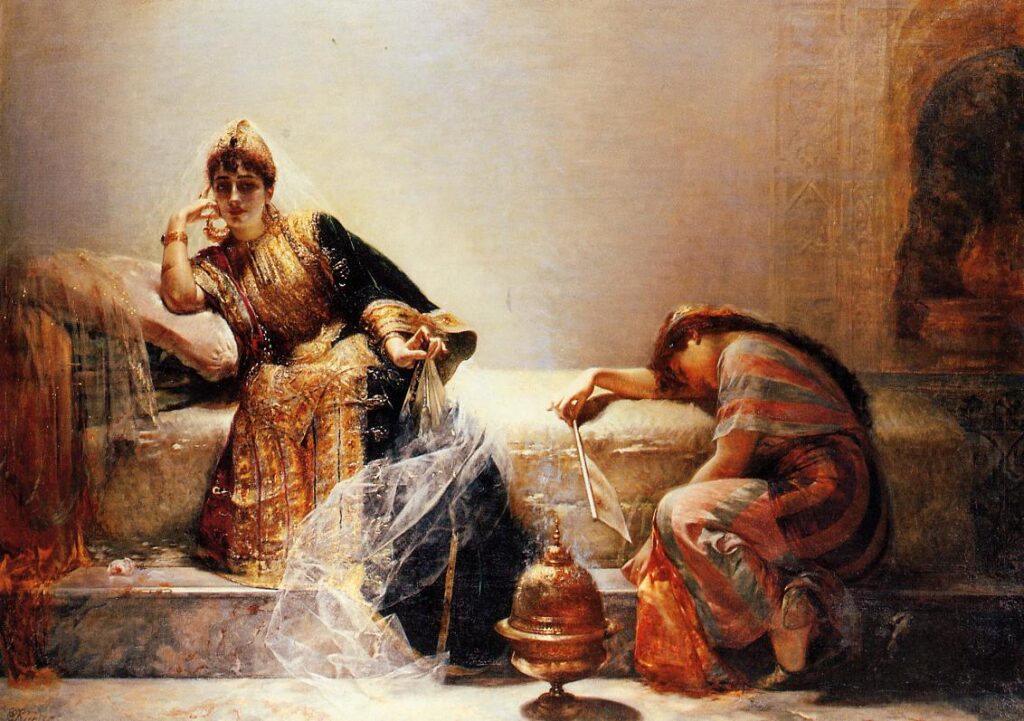
Edouard Frederic Wilhelm Richter, Scheherazade, credit Wikipedia
ENDNOTES, June 2021
In this edition: French song, from Chandos Records; RPO plays English music on BBC Radio 3, reviewed by STUART MILLSON
A sensuous musical delight from the balmy rural byways of France this time, courtesy of Chandos Records: an album entitled, Chère Nuit, in which the soprano, Louise Alder, joins pianist Joseph Middleton for an enchanting sequence of music from ‘La Belle Époque’. The title of the collection – Chère Nuit – is taken from an 1897 song of the same name by Alfred Bachelet (1864-1944) – a subtle craftsman of music, but not a well-known figure. This five-minute piece, marked Molto tranquillo, evokes a dreamy, yet intense nocturnal atmosphere. More frivolous contributions come in the form of Satie’s Je te veux (again, a work dating from 1897); a fin de siècle version, perhaps, of Edith Piaf’s Je ne regrette rien. Satie sets the words of poet, Henry Pacory:
‘I have no regrets
And I have but one desire:
To live close to you, so close,
For the rest of my life,
… That your body may be mine
And that all my flesh be yours.’
Clearly, love and desire burn deeply in the French imagination – a theme taken up, once again, in Pauline Viardot’s Haï luli! – with words by Xavier de Maistre, brother of the early-19th-century political philosopher, Joseph de Maistre.
“… If ever he is fickle,
If ever he should leave me,
The village might as well go up in flames,
And I, too, with the village.”
Poulenc’s Les Chemins de l’amour and Ravel’s 1903 evocation of the mystical Orient, Shéhérazade, settings of the wonderfully-named Tristan Klingsor (real name, Léon Leclère – poet and critic) provide the high-points of this programme. Louise Alder effortlessly matches the moods of each song – not least in the startling and far more operatic piece by Debussy, Apparition (1884). Pianist Joseph Middleton captures the fleeting, impressionist ideas of these Gallic composers, their evocations of the night sky, of candlelit cafés, of romance and tragic love; and yet immediately adjusts to the more astringent tones of Olivier Messiaen’s Trois Mélodies, written in 1930. Recorded at Potton Hall, Suffolk, the CD offers a fascinating, beguiling assortment of gentle timbres and emotional intensity.
The pianist Mark Bebbington has made a name for himself as an interpreter of the English repertoire of the 20th-century; championing, especially, the music of John Ireland, and offering us the revelation of a “new” work by Vaughan Williams. The world premiere of VW’s Fantasia for Piano and Orchestra was given at the 2012 English Music Festival and subsequently Bebbington recorded the piece with the Ulster Orchestra conducted by George Vass. Interviewed recently on BBC Radio 3, Mr. Bebbington explained his attraction to the solo piano music of John Ireland – commenting on how sensuously French it sounds, especially in the composer’s evocations of the Channel Islands. And the pianist demonstrated this very point in a concert from Cadogan Hall, broadcast on the 18th May, in which he gave a deeply-felt performance of Ireland’s trance-like, The Island Spell, from the three-piece set, Decorations. A sense of transcendental rural-inspired hypnotism was also shaped in a rendition of Gerald Finzi’s Eclogue – in which the Royal Philharmonic Orchestra under Michael Seal gave the softest of accompaniments; fully underlining the image we have of Finzi as classicist and mystic, looking into the sunshine on the high Downs.
Finally, and again to John Ireland, the Cadogan concert came to an end with his 1939, Concertino Pastorale – an infrequently-performed work which (to this reviewer) seems to inhabit a similar sound-world to Britten’s Variations on a Theme of Frank Bridge. Ireland’s ruralism and mellow sense of place suddenly becomes a more anxious orchestral landscape – as if a storm is approaching from the distance: dark grey clouds over a countryside in high-summer and the string-writing, radiant yet with a heightened tension and uncertainty. A tingle of electricity is in the air, on the eve of England’s entry into the second great global conflict of the 20th-century – and what better performers of this overlooked 20th-century miniature masterpiece than the string-players of the Royal Philharmonic.
Stuart Millson is the Classical Music Editor of The Quarterly Review
Details of the recordings:
Chère Nuit, French songs, sung by Louise Alder, with Joseph Middleton, piano. Chandos, 20222.
Vaughan Williams, Fantasia for Piano and Orchestra (with works by William Mathias). Mark Bebbington, piano, with George Vass conducting the Ulster Orchestra, SOMM 246.
BBC Radio 3, In Concert, Mark Bebbington, piano, Royal Philharmonic Orchestra, Michael Seal, conductor. https://www.bbc.co.uk/programmes/m000w2xx
Like this:
Like Loading...











